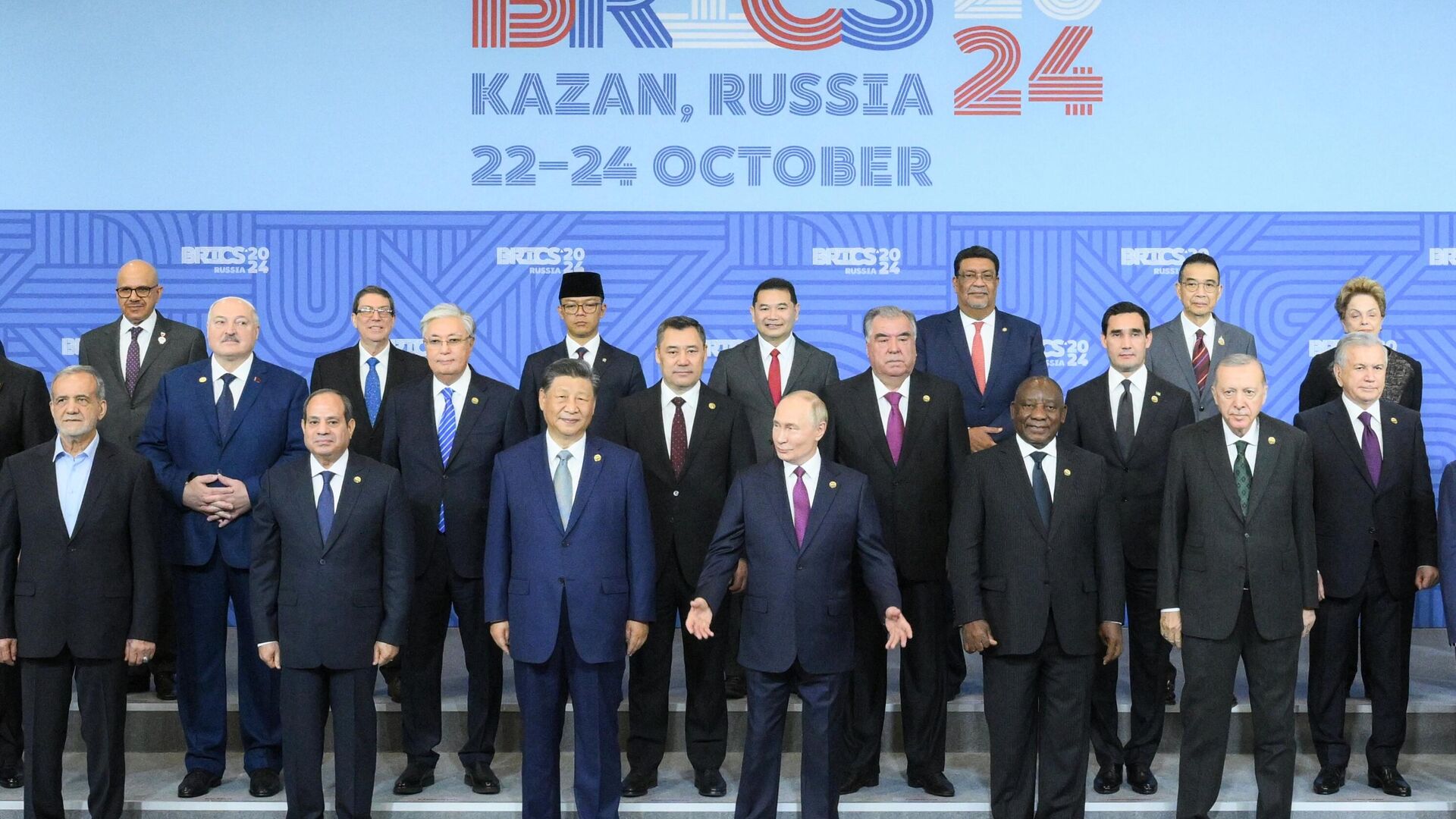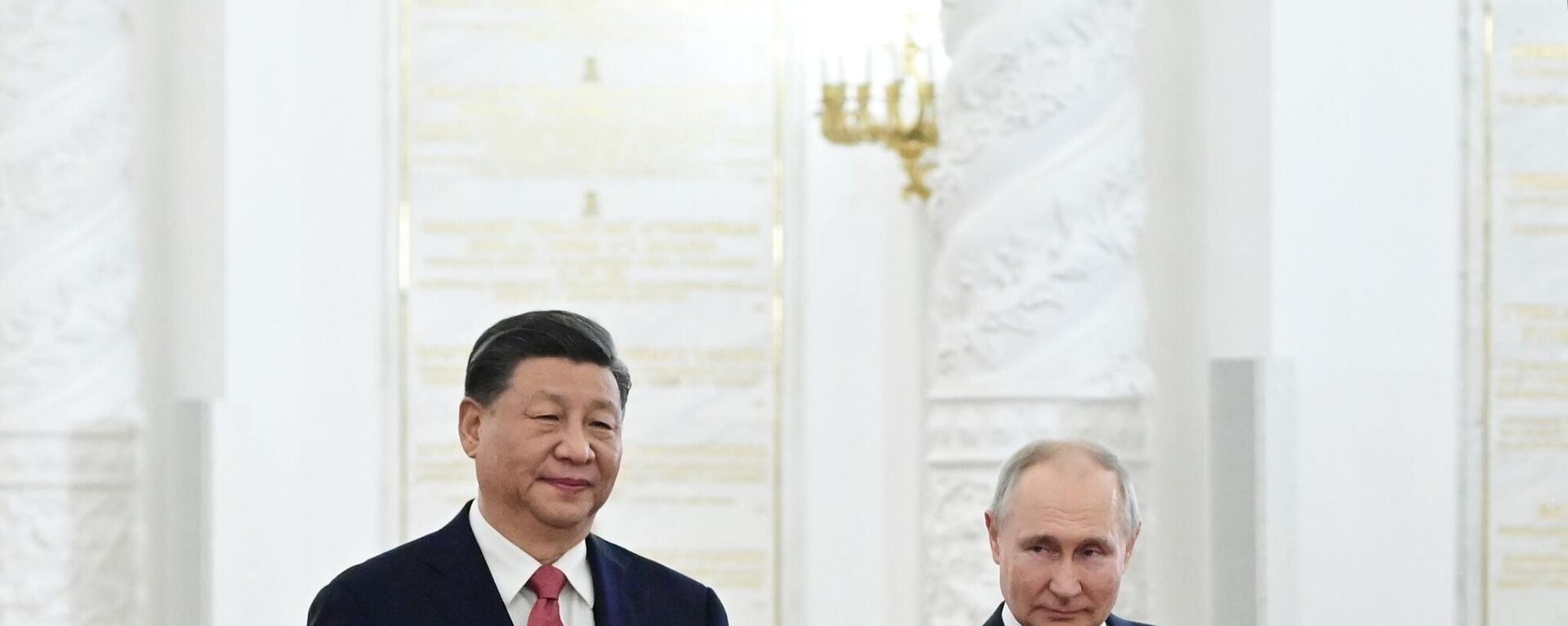https://sputniknews.in/20250909/brics-should-consider-collective-counter-sanctions-on-us-experts-9734975.html
BRICS Should Consider Collective Counter-Sanctions on US: Experts
BRICS Should Consider Collective Counter-Sanctions on US: Experts
Sputnik India
The US has upended the global trade order established after decades of negotiations, announcing reciprocal as well as punitive tariffs on many countries that... 09.09.2025, Sputnik India
2025-09-09T20:45+0530
2025-09-09T20:45+0530
2025-09-09T20:45+0530
sputnik opinion
donald trump
lula da silva
us
india
global south
brics
international monetary fund (imf)
brics pay
brics currency
https://cdn1.img.sputniknews.in/img/07e9/05/07/9081049_0:187:2979:1863_1920x0_80_0_0_78f605efb8a9eaa4a194824e3dc0340f.jpg
BRICS is poised to become a perfect example of global cooperation, and its member states together are set to emerge as a true counterweight to America's financial hegemony, experts have said.With 40% of the world's population and a quarter of global trade, the BRICS nations can enhance trade between themselves to offset US tariffs. Also, BRICS can consider collective counter-sanctions on the US on a few products to start with, just to convey a message to Washington D.C. against its trade hegemony, stated retired Rear Admiral Girish Kumar Garg.BRICS countries are the major target of US sanctions/tariffs. It is therefore essential that these countries remain united. This will help blunt the effect of US tariffs. Whilst the individual nations may not be able to stand up to the American trade hegemony, they can collectively, as BRICS, punch above their individual weight against the US, the strategic affairs commentator reckoned.Interestingly, during an extraordinary BRICS online summit on Monday, Brazilian President Luiz Inacio Lula da Silva stressed that secondary US sanctions limit the freedom to strengthen trade among friendly countries, including BRICS members.President Lula is right, secondary sanctions often act like invisible handcuffs on how countries can trade, acknowledged Dr. Srinivasan Balakrishnan, Director of Strategic Engagements & Partnerships, at Indic Researchers Forum (IRF), a geopolitical think tank based in India's National Capital Region (NCR).But BRICS has a unique opportunity here. It's about creating resilience and independence. By expanding trade in local currencies, scaling initiatives like BRICS Pay, and pooling investments in infrastructure, technology, and energy security, BRICS can strengthen internal supply chains and reduce vulnerability to external pressures, he noted.With its sheer scale, covering nearly half the world's population and vast natural resources, BRICS is positioned to set a new template for global cooperation. BRICS is pro-choice, pro-development, and pro-fairness in global trade, the international relations pundit underscored.However, a united BRICS can dilute that power. Local currency trade, platforms like BRICS Pay, and alternative payment systems reduce dollar dependency. Their diverse resources, from Brazil's agriculture and Russia's energy to China's manufacturing and India's services, make it possible to build supply chains resilient to U.S. pressure. Institutions like the New Development Bank have already shown what an independent financial pathway looks like, free from the strings often tied to IMF or World Bank loans, he added.If BRICS splinters, each nation risks being pressured in isolation. If it stays united, it negotiates as an equal bloc, shaping a multipolar order where no single power sets all the rules. That's the essence of Lula's call for solidarity, to ensure fairness and freedom in global trade, the observer explained.To reduce the exposure of the secondary sanctions, it can expand trade in local currencies through de-dollarisation, develop independent financial and payment systems, and deepen economic ties within the Global South to minimise exposure to secondary sanctions, said Preeti Khenta, an Associate Fellow at the Rajasthan-based Usanas Foundation.
https://sputniknews.in/20250908/putin-xi-to-attend-brics-virtual-summit-via-video-link-on-8-september-9729024.html
us
india
global south
delhi
new delhi
washington d.c.
Sputnik India
feedback.hindi@sputniknews.com
+74956456601
MIA „Rossiya Segodnya“
2025
Pawan Atri
https://cdn1.img.sputniknews.in/img/07e6/0c/13/139630_147:0:831:684_100x100_80_0_0_8fa2b25903e7787fe6a2698552c167df.png
Pawan Atri
https://cdn1.img.sputniknews.in/img/07e6/0c/13/139630_147:0:831:684_100x100_80_0_0_8fa2b25903e7787fe6a2698552c167df.png
News
en_IN
Sputnik India
feedback.hindi@sputniknews.com
+74956456601
MIA „Rossiya Segodnya“
Sputnik India
feedback.hindi@sputniknews.com
+74956456601
MIA „Rossiya Segodnya“
Pawan Atri
https://cdn1.img.sputniknews.in/img/07e6/0c/13/139630_147:0:831:684_100x100_80_0_0_8fa2b25903e7787fe6a2698552c167df.png
donald trump, lula da silva, us, india, global south, brics, international monetary fund (imf) , brics pay, brics currency, brics expansion, s. jaishankar, delhi, new delhi, tariffs, sanctions, western sanctions, multilateralism, global economy, washington d.c.
donald trump, lula da silva, us, india, global south, brics, international monetary fund (imf) , brics pay, brics currency, brics expansion, s. jaishankar, delhi, new delhi, tariffs, sanctions, western sanctions, multilateralism, global economy, washington d.c.
BRICS Should Consider Collective Counter-Sanctions on US: Experts
The US has upended the global trade order established after decades of negotiations, announcing reciprocal as well as punitive tariffs on many countries that did not give in to American pressure, experts have said.
BRICS is poised to become a perfect example of global cooperation, and its member states together are set to emerge as a true counterweight to America's financial hegemony, experts have said.
With 40% of the world's population and a quarter of global trade, the BRICS nations can enhance trade between themselves to offset US tariffs. Also, BRICS can
consider collective counter-sanctions on the US on a few products to start with, just to convey a message to Washington D.C. against its trade hegemony, stated retired
Rear Admiral Girish Kumar Garg.
"Furthermore, moving away from the US Dollar and having a common 'BRICS Currency' for trade can forever end the American trade hegemony and also give a voice to the Global South in international trade," the Indian Navy veteran told Sputnik India.
BRICS countries are the major target of US sanctions/tariffs. It is therefore essential that these countries remain united. This will help blunt the effect of US tariffs. Whilst the individual nations may not be able to stand up to the American trade hegemony, they can collectively, as BRICS, punch above their individual weight against the US, the strategic affairs commentator reckoned.
Interestingly, during an extraordinary BRICS online summit on Monday,
Brazilian President Luiz Inacio Lula da Silva stressed that secondary US sanctions limit the
freedom to strengthen trade among friendly countries, including BRICS members.
"The introduction of extraterritorial measures threatens our institutions, secondary sanctions limit our freedom to strengthen trade among friendly countries, 'divide and rule' is the new strategy of unilateral action, and BRICS must show that cooperation is above all," the Brazilian leader said.
President Lula is right, secondary sanctions often act like invisible handcuffs on how countries can trade, acknowledged Dr. Srinivasan Balakrishnan, Director of Strategic Engagements & Partnerships, at Indic Researchers Forum (IRF), a geopolitical think tank based in India's National Capital Region (NCR).
But BRICS has a unique opportunity here. It's about
creating resilience and independence. By expanding trade in local currencies, scaling initiatives like BRICS Pay, and pooling investments in infrastructure, technology, and energy security, BRICS can strengthen internal supply chains and reduce vulnerability to external pressures, he noted.
With its sheer scale, covering nearly half the world's population and vast natural resources, BRICS is positioned to set a new template for global cooperation. BRICS is pro-choice, pro-development, and pro-fairness in global trade, the international relations pundit underscored.
"The US has long relied on 'divide and rule' to preserve its economic dominance. BRICS' strength lies in unity. Together, representing nearly half the world's population and over a third of global GDP in PPP terms, BRICS isn’t just a forum; it's a counterweight to financial hegemony. Washington uses the dollar and systems like SWIFT to enforce sanctions and dictate trade rules, often sidelining those who don't toe its line," Balakrishnan said in an interview with Sputnik India.
However, a united BRICS can dilute that power. Local currency trade, platforms like BRICS Pay, and alternative payment systems reduce dollar dependency. Their diverse resources, from Brazil's agriculture and Russia's energy to China's manufacturing and India's services, make it possible to build supply chains resilient to U.S. pressure. Institutions like the New Development Bank have already shown what an independent financial pathway looks like, free from the strings often tied to IMF or World Bank loans, he added.
If BRICS splinters, each nation risks being
pressured in isolation. If it stays united, it negotiates as an equal bloc, shaping a multipolar order where no single power sets all the rules. That's the essence of Lula's call for solidarity, to ensure fairness and freedom in global trade, the observer explained.
To reduce the exposure of the secondary sanctions, it can expand trade in local currencies through de-dollarisation, develop independent financial and payment systems, and deepen economic ties within the Global South to minimise exposure to secondary sanctions, said Preeti Khenta, an Associate Fellow at the Rajasthan-based Usanas Foundation.
"Together, these countries account for a sizeable share of the world's population, markets, and resources. Unity enables them to establish independent financial systems and promote trade using local currencies. This will lessen the dependency on American hegemony as an economic superpower. Additionally, it also amplifies their influence in global decision-making platforms, making it more difficult for the US to use divide-and-conquer strategies," the think tanker underlined.



